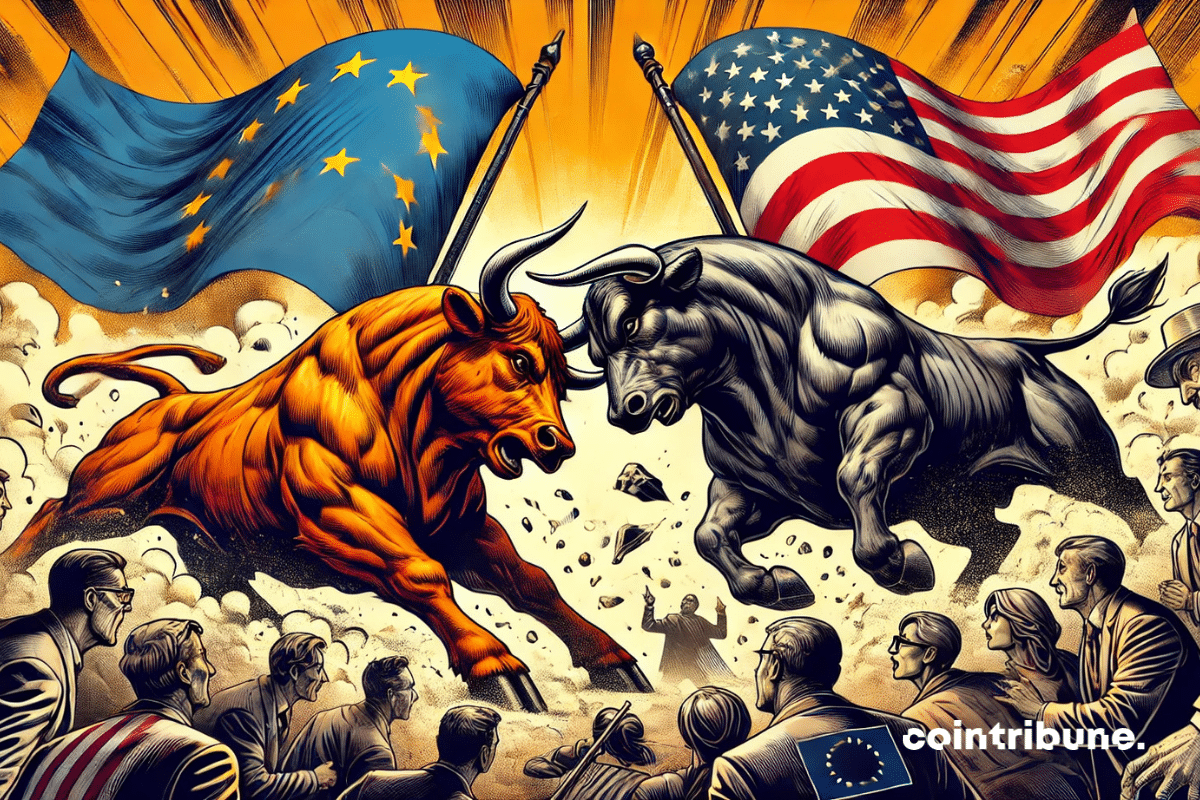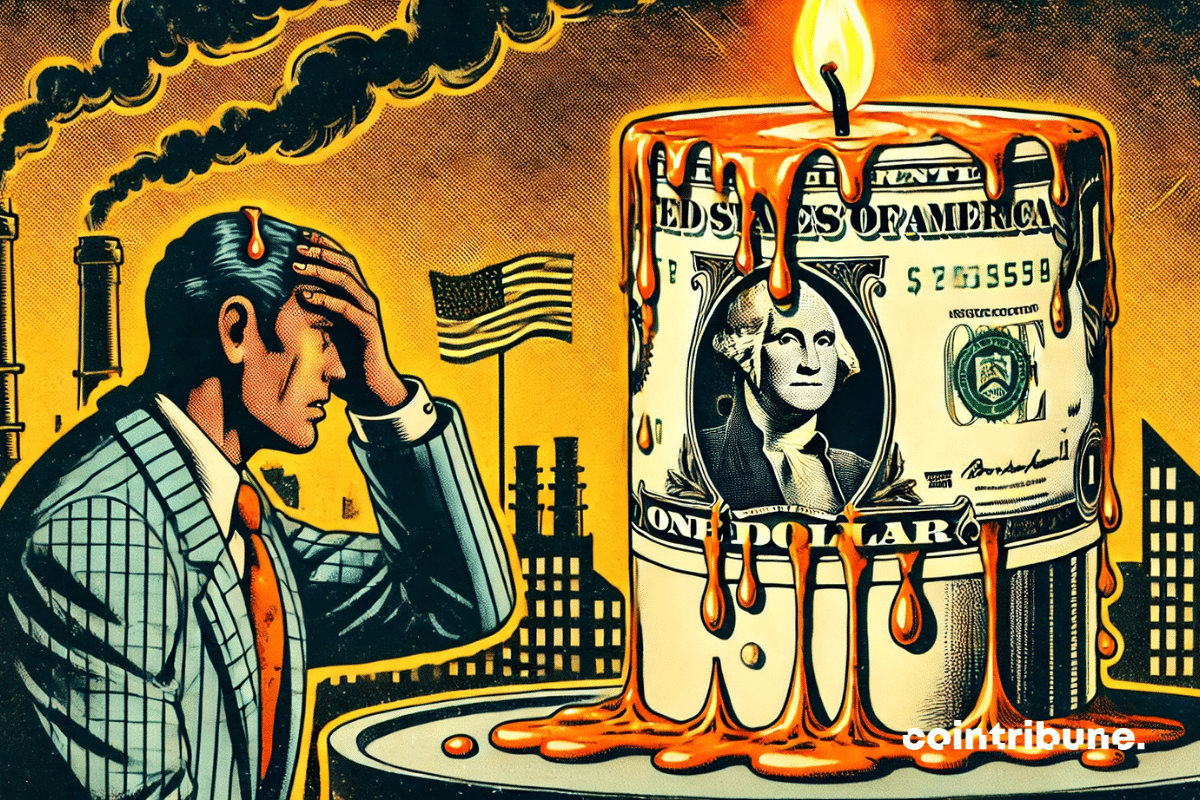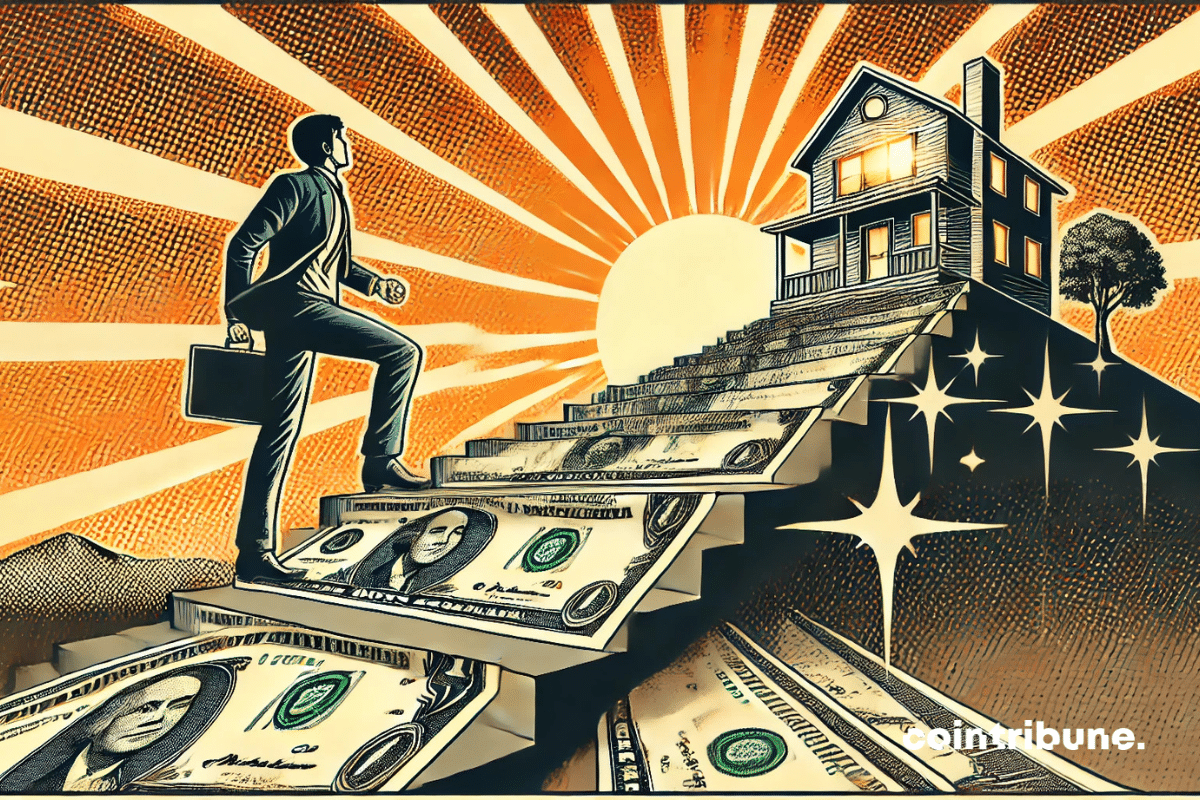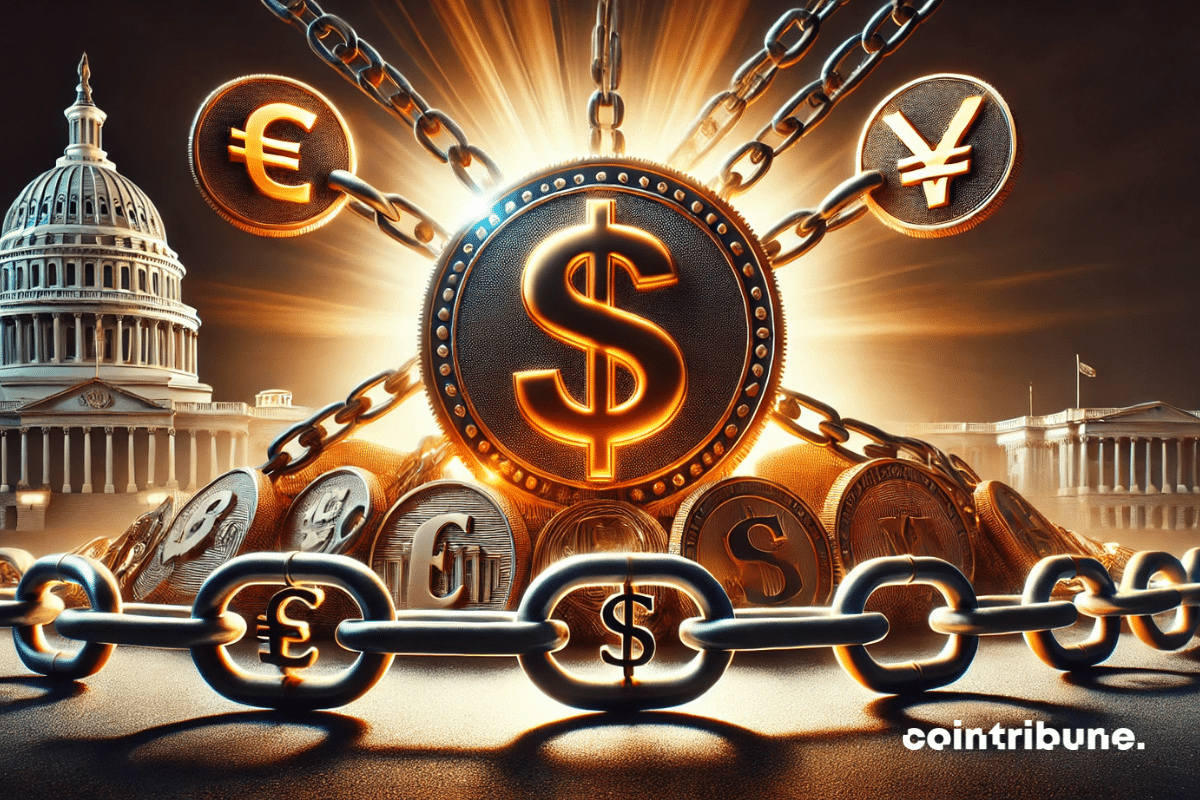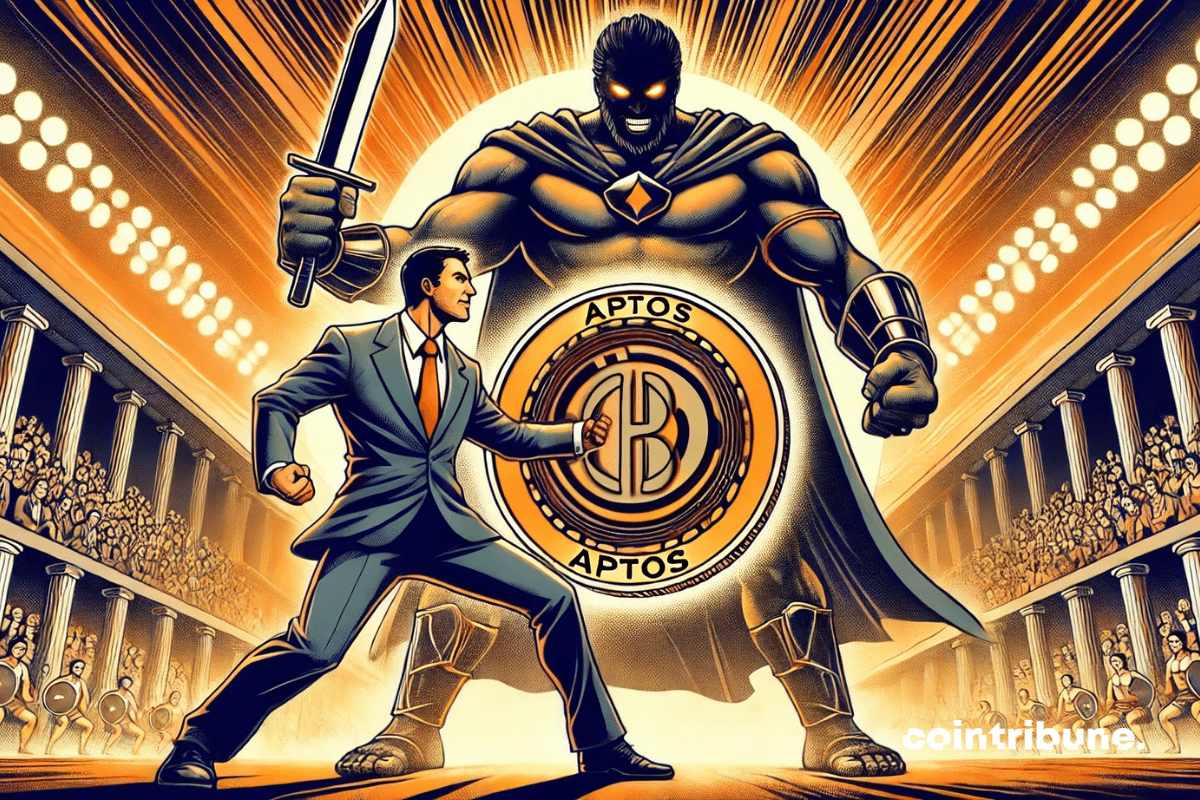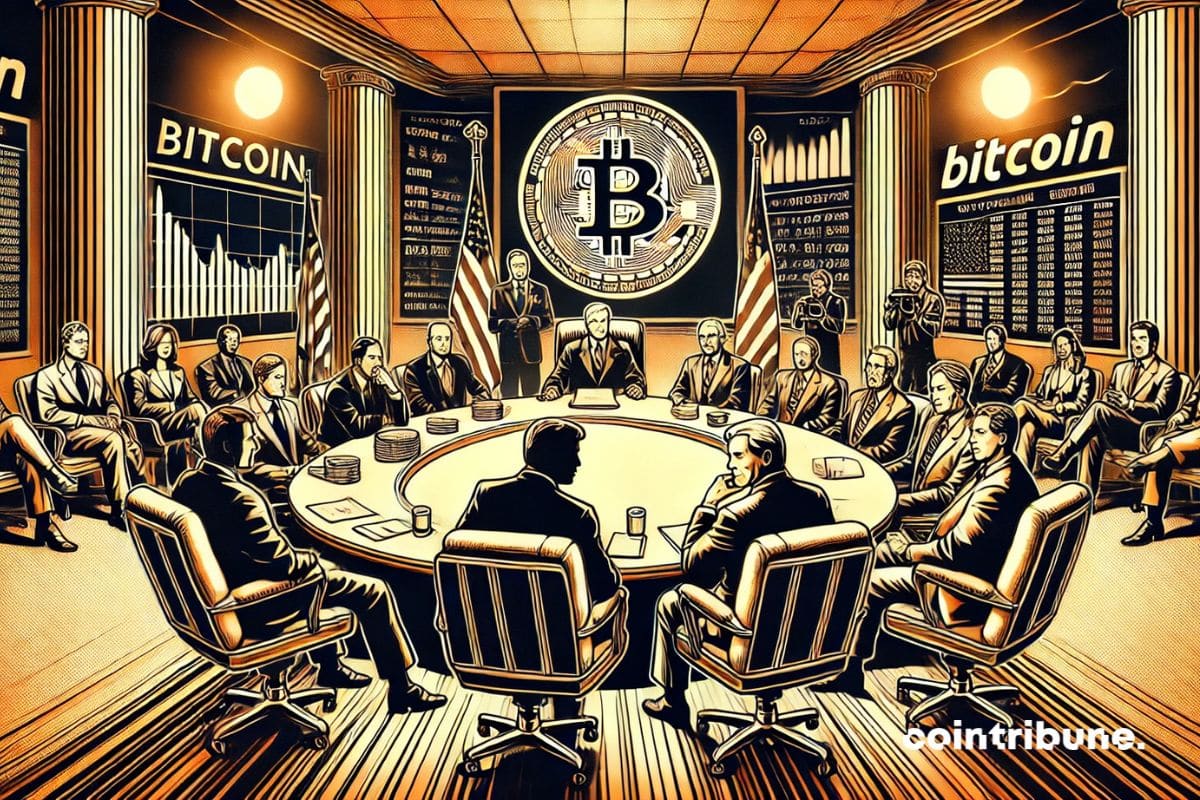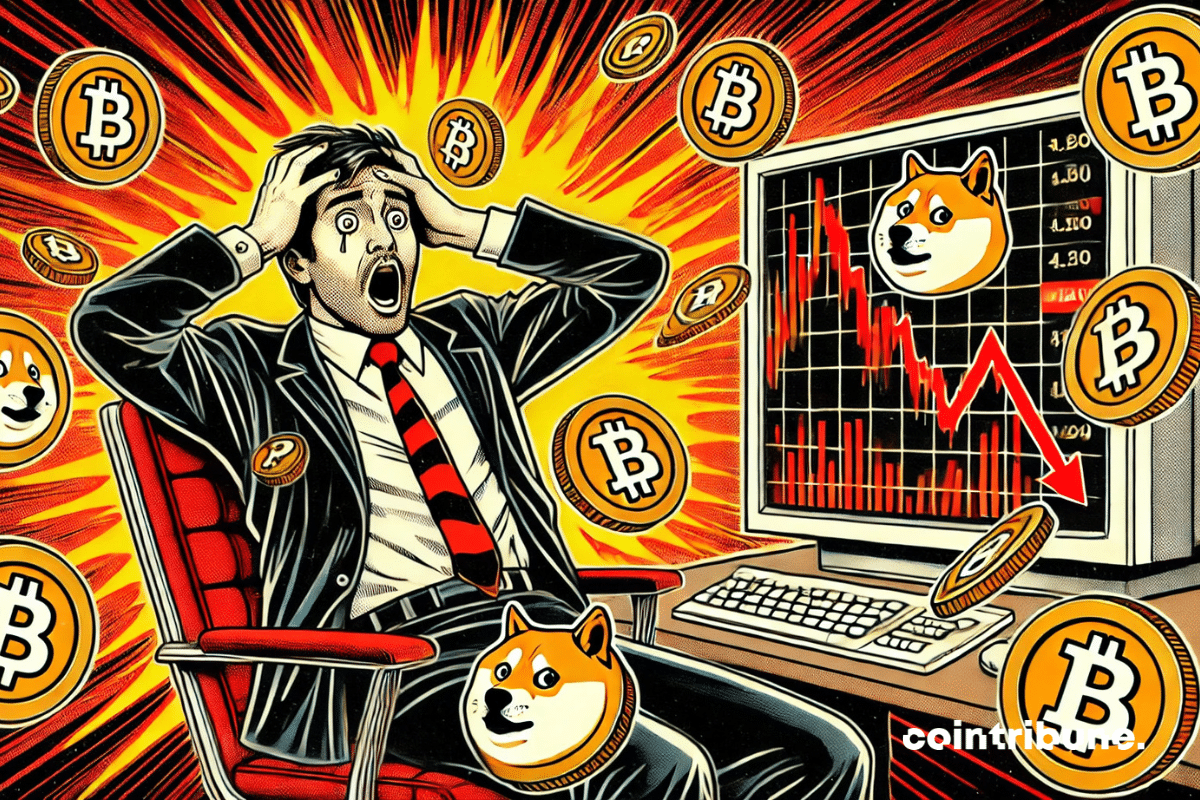Investors are closely monitoring every signal from the American Federal Reserve (Fed), whose monetary policy could trigger a bear market. While some were hoping for rate cuts as early as 2024, the latest statement from Fed Chair Jerome Powell has dampened those expectations. The absence of rate reductions could put pressure on financial markets, particularly on risky assets like Bitcoin. Economist Timothy Peterson warns: if the Fed does not cut rates by 2025, the Nasdaq could collapse, dragging the cryptocurrency market along with it. A new correction of Bitcoin below $70,000 is now a serious possibility.
Getting informed
The financial story of the United States may well be on the brink of a major turning point. As the national debt reaches new heights and economic tensions escalate, a key player in the crypto sector, Michael Saylor, proposes a bold strategy: to make bitcoin a national strategic asset. At a summit held at the White House, the founder of Strategy advocated for massive investment by the U.S. government in bitcoin, suggesting that the United States should acquire up to 25% of the total supply by 2035. This proposal, as ambitious as it is controversial, relies on a long-term vision in which bitcoin would become a pillar of American economic prosperity. In response to this announcement, the White House has already taken a first step by signing a decree that establishes a strategic reserve of bitcoin.
In a market as volatile as cryptocurrencies, every second counts. RunBot, with its state-of-the-art AI (artificial intelligence), is transforming automated trading by providing traders with powerful tools to maximize gains and reduce risks. Here's how you can enhance your trading experience with AI.
At the recent crypto summit at the White House, Michael Saylor, co-founder of Strategy, presented an ambitious strategy aimed at generating up to 100 trillion dollars in economic value over the next decade. All of this, based solely on bitcoin! How?
Bitcoin (BTC) could soon experience significant volatility and trigger over $1.13 billion in long position liquidations if its price falls below the critical threshold of $82,000. Currently trading at $83,000, bearish pressure is intensifying as investors react negatively to recent announcements regarding the strategic bitcoin reserve in the United States.
For several days now, the crypto market has been in turmoil. With 1.43 billion XRP traded in just 24 hours, investors are questioning: simple market movement or signs of a radical change? While some see it as an opportunity, others fear speculative manipulation. Analysis.
Innovation is a necessity in the blockchain universe, where competitiveness relies on speed, scalability, and user experience. It is in this context that BNB Chain is about to take a decisive step with the Pascal hard fork, a major technical update scheduled for March 20. Unveiled by Changpeng Zhao (CZ), this evolution promises to enhance compatibility with the Ethereum Virtual Machine (EVM) and strengthen the ecosystem's accessibility for developers and users.
The history of cryptocurrencies is marked by episodes where volatility defies the logic of markets. Solana (SOL), one of the most promising blockchain ecosystems, is currently experiencing an intense phase of fluctuations. While its price has seen a significant drop in recent days, its trading volume has witnessed a spectacular surge. Over 5.18 billion dollars have flowed through the platforms, a movement that is as intriguing as it is concerning. This resurgence of activity reveals a complex dynamic where financial losses and hopes for a rebound intertwine.
A European stock market in full swing, investors overjoyed, and Wall Street wondering where its crown has gone... Is the stock market history now being written the European way?
The Salvadoran government has added more than 13 bitcoins to its reserves since March 1, openly defying the conditions of the $1.4 billion loan provided by the International Monetary Fund. Despite international pressures, President Nayib Bukele claims that nothing will stop his country's accumulation strategy.
The American economy is going through a turbulent phase. Between rising inflation and a marked slowdown in growth, a long-forgotten specter resurfaces: stagflation. This phenomenon, which combines economic stagnation and rising prices, evokes the crises of the 1970s. Today, Donald Trump's new tariff policies rekindle fears of a return to that time when growth was stalled and purchasing power was eroding rapidly. The American president's decision to impose heavy taxes on Chinese, Mexican, and Canadian imports raises many questions about their real effects on the economy. As the Federal Reserve is pushed to its limits, markets are wavering, and businesses are concerned about the repercussions on their profitability.
Political decisions shape the future of cryptocurrencies, and the crypto summit organized by the Trump administration at the White House on March 7 is a glaring proof of this. This event, which aimed to establish a new posture for the United States towards the blockchain industry, sparked mixed reactions. While some observers see it as an institutional recognition of Bitcoin and a strategic turning point, others denounce it as a mere political stunt without concrete measures. This meeting, which coincided with the announcement of the creation of a strategic reserve of Bitcoin, had an immediate impact on the markets, leading to a 7.3% drop in BTC and massive outflows from Bitcoin ETFs. So, real progress or just a publicity stunt?
Bitpanda's behavioral study reveals notable differences in investment approaches based on gender. Women adopt more methodical and long-term oriented strategies, demonstrating a more disciplined investment approach than their male counterparts.
The price of XRP is facing increasing technical and fundamental pressure, indicating a major decline of 20% in the very near future. Three decisive factors are clearly emerging, and the future of XRP may already be sealed. In light of these concerning signals, investors will need to be extra vigilant and anticipate possible scenarios to protect their positions.
Access to mortgage credit is a key barometer of economic health and the purchasing power of households. After a drastic decline in lending volumes in 2023, the European Central Bank (ECB) has initiated a shift with its first rate cut. This decision, welcomed by the Governor of the Bank of France, François Villeroy de Galhau, is accompanied by a series of indicators that suggest a gradual recovery in the market. But is this upswing sustainable? And above all, will it be enough to permanently reverse the trend for borrowers and actors in the real estate sector?
No more obscure listings! From now on, Binance lets its community play the role of the master of ceremonies. A sense of democracy... or an illusion that will always benefit the most powerful?
Scott Bessent, U.S. Treasury Secretary, announced yesterday at the White House crypto summit that Washington plans to use stablecoins to strengthen the dollar's position as the dominant reserve currency.
According to a recent study by crypto market researcher Mark Quant, the increase in the Global Liquidity Index (GLI) could be a key factor in the recovery of the cryptocurrency market. This dynamic could propel the total market capitalization beyond 4 trillion dollars by the second quarter of 2025, thereby reaching new historical highs.
Yesterday, surrounded by four gray walls and the clinking of bars, Sam Bankman-Fried blew out his 33 candles. A celebration far from the golden trappings of his FTX days, but under the spotlight of a scandal that still shakes the crypto world. Sentenced to 25 years in prison, the former golden boy of cryptocurrencies provides, from his cell, a version of his story where innocence and political calculation intertwine.
The French justice system is currently facing a bitcoin fraud case of considerable magnitude, involving two Franco-Israelis accused of embezzling nearly 12 million euros. One of them, Julien-Daniel X., is being held in detention after being arrested in France during a ski trip. He claims to have been arrested solely because he is Israeli.
On the crypto scene, Trump plays the alchemists: he transforms tokens into gold… but the magic primarily works for those around him.
The volatility of cryptocurrencies spares no one, and Solana (SOL) is no exception. After reaching a low of $125 on February 28, the native token of the Solana blockchain saw a rebound of 17%, hinting at a possible return towards $180. However, this recovery is far from guaranteed. Still down 50% from its all-time high of $295, SOL is facing several obstacles that could hinder its ascent. Between the slowdown in its on-chain activity, the lack of demand in the derivatives markets, and the concentration of transaction fees in the hands of a handful of users, the Solana ecosystem is wavering. What are the signals that could trigger a bullish rally?
Bitwise is preparing an Aptos ETF: a major breakthrough or too risky a bet for crypto investors? The details in this article.
On Friday, March 7, 2025, the President of the United States, Donald Trump, welcomed leading figures from the crypto industry to the White House for an unprecedented summit. The main objective of this meeting was to discuss the creation of a strategic reserve of cryptocurrencies, a bold project that could redefine the role of digital assets in the American economy. Here’s what really happened!
The global economic scene is in full turmoil. In just a few months, trade tensions between China and the United States have reached a new level, severely impacting the foreign trade of the Asian giant. Official figures released by Chinese customs indicate a brutal slowdown, much more pronounced than expected, in exports and imports. In the background, a declining internal consumption and an uncertain economic climate amplify concerns. As Beijing sets an ambitious growth target, this halt raises many questions about the country's ability to maintain its dynamism in the face of repeated attacks from Washington.
The crypto exchange Binance blocks airdrops in Nigeria. In this article, discover the real reasons behind this restriction.
The fragile balance of the conflict in Ukraine has just experienced a new twist. Donald Trump, the American president, discussed the possibility of imposing massive bank sanctions and high tariffs against Russia. This statement comes as Moscow intensifies its strikes on Ukrainian infrastructure, while Washington's position wavers between conditional support for Kiev and seeking a diplomatic solution. However, this posture of firmness is accompanied by contradictory decisions, raising questions about Trump's true intentions in foreign policy.
Donald Trump is hosting over 20 leaders of the crypto industry at the White House tonight for an unprecedented summit. This meeting, scheduled from 6:30 PM to 10:30 PM UTC, comes on the heels of the signing of a presidential decree establishing a Strategic Reserve of Bitcoin.
The excitement around memecoins has significantly cooled in recent weeks, after having reached a historic peak. According to Bobby Ong, founder of CoinGecko, while these meme-based cryptos may seem temporarily "dead", their cyclical nature suggests an inevitable return to the market.
The NFT eldorado has turned into a frozen desert: 13.7 billion in volumes vanished, a crash worthy of the most beautiful digital illusions. Who will still bet on these mirages?








